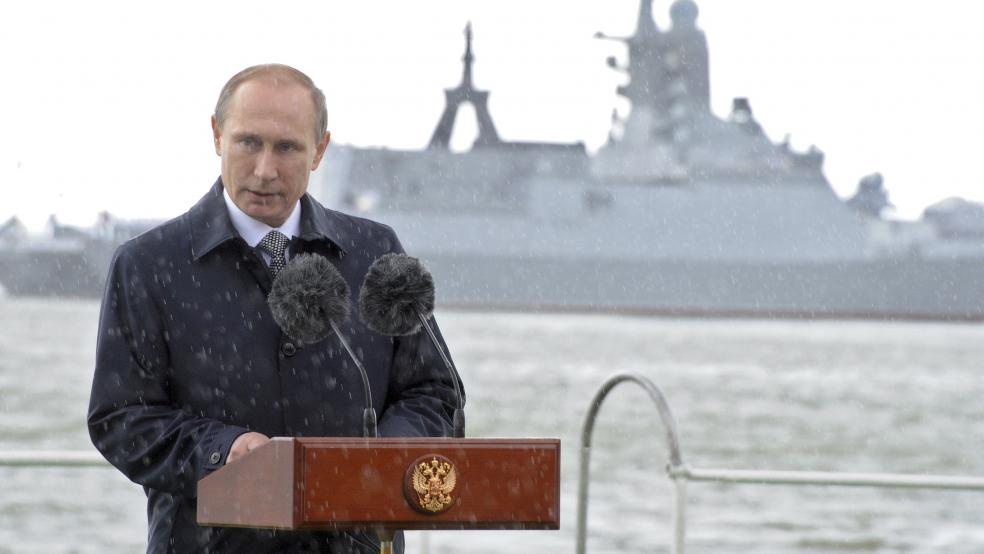Increasing evidence that the Russian airliner carrying 224 people that crashed in Egypt on Oct. 31 was taken down by a bomb planted by the terror group ISIS has generated quite a bit of speculation about how Russian President Vladimir Putin might react.
With Russian jets already conducting airstrikes in Syria, at least some of which have been directed at ISIS, would Putin escalate the Russian presence in the Middle East? He could increase the assets dedicated to the air campaign and perhaps even declare that Russian ground troops, taken off the table at the start of the air operations, are now a possibility.
Related: Putin Moves Anti-Aircraft Missiles to Syria. Why?
The Kremlin has actively pushed back on Western assertions that the crash appears to be the result of a bomb, delaying the need to deliver a public response if that does turn out to be the case. But a scholar who studies the Russian military says that if Putin is faced with the need to ratchet up the pressure in Syria, his options are actually severely limited.
According to Pavel K. Baev, a research professor at the Peace Research Institute in Oslo and a non-resident senior fellow at the Brookings Institution, the combination of an ongoing military action in Ukraine and an ill-equipped force that went through an incomplete “reform” in the past decade has left the Russian military machine badly overstretched.
“The Russian intervention in Syria is only possible at all because the “hybrid war” in Eastern Ukraine, which has tied up the bulk of Russian combat-capable battalions, has seen virtually no use of the air force,” Baev wrote in a paper published on the Brookings website. “Moscow sought to use this free capacity for staging demonstrations of air power over the Baltic theater but encountered effective containment — it has since scaled down its provocations. Syria appeared an easier option, and the deployment of an air regiment to the hastily prepared Hmeymym airbase outside Latakia went remarkably smoothly. As the air war has moved into the second month, however, issues with its trajectory have emerged.”
He continues, “Escalation will be difficult because few other power projection options are available. The cruise missile salvo by the frigates of the Caspian flotilla on Russian President Vladimir Putin’s birthday was sensational, but it has seriously upset Kazakhstan and Azerbaijan and so cannot be repeated. It had little resonance on the battlefield anyway.
Related: Brookings Scholar to Vladimir Putin – Fight Me!
“Expanding the scale of intervention would be logistically very difficult. The Russian navy had to lease and purchase eight commercial transports in order to deliver supplies for the operation at the level of up to 50 sorties a day (which means one sortie per aircraft). Its only aircraft carrier Admiral Kuznetsov is undergoing repairs (as it is most of the time), and the navy command could only dream of building an amphibious assault ship that would compare with Mistral-class ships, which France has refused to deliver.
In Baev’s assessment – and that of a number of other observers – Putin’s intervention in Syria was as much about supporting his own image at home as it was about helping out Syrian dictator Bashar al-Assad, one of his few allies in the region. The Russian people are still struggling under a dismal economy and over the past two years Putin’s public remarks have seemed increasingly bellicose, casting Russia as a country besieged by its enemies.
Since the advent of the Syria operation, Russian media, mostly controlled by the Kremlin, has been overflowing with pictures and videos of Russian airstrikes and stories outlining their success.
However, aside from a relatively small amount of territory changing hands, the overall effect of the Russian airstrikes appears to have been limited. If Putin was hoping to quickly force peace talks on the rebels fighting Assad and on ISIS, he has failed, and is now faced with a dilemma. He can either remain in Syria and risk taking a large share of the blame if things go south or pull out without a clear victory.
Related: Are Cuban Troops Backing up Putin and Assad in Syria?
Baev warns that Putin may eventually determine that he needs yet another military adventure to distract from the “quagmire” developing in Syria.
Georgia might be chosen again as a target of convenience, but the fact of the matter is that there are fewer and fewer uncommitted military capabilities to wield.
The bottom line is that, for the sake of regime survival, Putin has fallen back to the “safe” position of military confrontation. But the Russian military is not able to prevail in that confrontation and the Russian economy cannot possibly sustain it.





